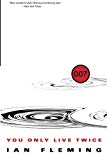
The central character in the novel is James Bond himself and the novel ends with his obituary, purportedly written for The Times by M. The obituary provides a number of biographical details of Bond's early life, including his parents' names and nationalities. Bond begins You Only Live Twice in a disturbed state, described by M as "going to pieces", following the death of his wife Tracy eight months previously. Academic Jeremy Black points out that it was a very different Bond to the character who lost Vesper Lynd at the end of Casino Royale . Given a final chance by M to redeem himself with a difficult mission, Bond's character changes under the ministrations of Dikko Henderson, Tiger Tanaka and Kissy Suzuki. The result, according to Benson, is a Bond with a sense of humour and a purpose in life. Benson finds the transformation of Bond's character to be the most important theme in the novel: that of rebirth. This is suggested in Bond's attempt at a haiku, written in the style of Japanese poet Matsuo Bashō:
The rebirth in question is that of Bond, transformed from the heavily drinking man mourning his wife at the beginning of the book to a man of action and then, after the death of Blofeld, becoming Taro Todoroki, the Japanese partner of Kissy Suzuki. While Bond is in his action phase, Benson sees Fleming's writing becoming allegorical and epic, using Bond as a symbol of good against the evil of Blofeld. As in Goldfinger and The Spy Who Loved Me , Bond is referred to as St George in his fight against the dragon, this time by Tiger Tanaka, who says that "it would make the subject for a most entertaining Japanese print."
According to the author of continuation Bond novels, Raymond Benson, Kissy Suzuki is "a most appealing heroine" and "apparently loves Bond very much." Apart from being the mother of Bond's unborn child at the end of the book, Suzuki also acts as a "cultural translator" for Bond, helping explain the local traditions and customs: Quarrel had the same function in Live and Let Die and Dr. No . Academic Christoph Lindner identifies Tiger Tanaka as one of Fleming's characters with morals closer to those of traditional villains, but who act on the side of good in support of Bond; others of this type have included Darko Kerim ( From Russia, with Love ), Marc-Ange Draco ( On Her Majesty's Secret Service ) and Enrico Colombo ("Risico").
Blofeld makes his third appearance in the Bond series in You Only Live Twice and Benson notes that on this occasion he is quite mad and egocentric in his behaviour; Tanaka refers to him as "a devil who has taken human form". Comentale, Watt and Willman note that Fleming, through Bond, parallels Blofeld with Caligula, Nero and Hitler, and that this exemplifies Blofeld's actions as being on "a titanic scale", as much of the criminal action was throughout the Bond series. Linder echoes this, noting that the crimes perpetrated are not against individuals per se , but entire nations or continents.
Much in the novel concerns the state of Britain in world affairs. Black points out that the reason for Bond's mission to Japan is that the US did not want to share intelligence regarding the Pacific, which it saw as its "private preserve". As Black goes on to identify, however, the defections of four members of MI6 to the Soviet Union had a major impact in US intelligence circles on how Britain was viewed. The last of the defections was that of Kim Philby in January 1963, while Fleming was still writing the first draft of the novel. Black contends that the conversation between M and Bond allows Fleming to discuss the decline of Britain, with the defections and the 1963 Profumo Affair as a backdrop.
The theme of Britain's declining position in the world is also dealt with in conversations between Bond and Tanaka, Tanaka voicing Fleming's own concerns about the state of Britain in the 1950s and early 60s. Tanaka accuses Britain of throwing away the empire "with both hands"; this would have been a contentious situation for Fleming, as he wrote the novel as the Indonesia–Malaysia confrontation was breaking out in December 1962, a direct challenge to British interests in the region. Fleming's increasingly jaundiced views on America appear in the novel too, through Bond's responses to Tiger's comments, and they reflect on the declining relationship between Britain and America: this is in sharp contrast to the warm, co-operative relationship between Bond and Leiter in the earlier books.
Already have an account? Log In Now